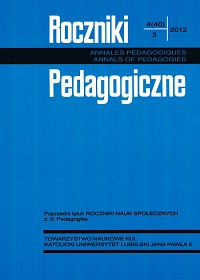Child in the Entanglement of Its Parents’ Divorce
Main Article Content
Abstract
Economic, political as well as moral changes have altered family structure. At present, more and more children are raised in (incomplete) broken families. Divorce influences all the functions of family. It triggers off a whole series of transitions that modify lives of people taking part in it.
The aim presented in the article is an attempt to answer the following question: “If, and how the disintegration of family influences the psychosocial functioning of a child”.
The research refers to a group of sixty children aged between 7 and 9. The basic group consisted of broken families and the comparison group consisted of complete families. For the analysis of the attitude of parents M. Ziemska Questionnaire for Parents was used. For the assessment of manifestation and level of psychosocial functioning of children the CBI E. Schaefer and M. Aaronson Questionnaire was used.
It was stated-ehat there is a relation between some parental attitudes and psychosocial functioning of examined children. Family disintegration and lack of contact with the father have harmful influence on the child. Children from incomplete families are characterised by lower level of verbal expression and tactful behaviour. They are more nervous and ferocious. Higer level of social alienation is also more common among them.
Article Details
References
Badora S., Czeredrecka B., Marzec D., Rodzina i formy jej wspomagania, Kraków: Oficyna Wydawnicza „Impuls” 2001.
Bauserman R„ Child adjustment in joint custody versus sole-custody arrangements: a meta-analytic review, „Journal of Family Psychology” 16(2002), nr 1, s. 91-102.
Beisert M., Rozwód - proces radzenia sobie z kryzysem, Poznań: Wydawnictwo Fundacji Humaniora 2000.
Beisert M., Rozwód jako wydarzenie krytyczne w cyklu rozwoju rodziny, „Problemy Rodziny” 1994, nr 2, s. 41-46.
Block J.H., Block J., Gjerde P.F., The Personality of Children Prior to Divorce: A Prospective Study, „Child Development” 57(1986), s. 827-840.
Brągiel J., Konsekwencje rozbicia rodziny doświadczane przez dzieci, „Problemy Opiekuńczo-Wychowawcze” 1992, nr 7, s. 89-93.
Chojnacka W., Reakcje dzieci na rozwód rodziców, „Problemy Opiekuńczo- Wychowawcze” 2003, nr 3, s. 41-44.
Cudak H., Szkice z badań nad rodziną, Kielce: WSP im. Jana Kochanowskiego 1995.
Emery R.E., Interparental conflict and the children of discort and divorce, „Psychological Bulletin” 2(1982), s. 310-330.
Hetherington E.M., Cox M., Cox R., Effects of Divorce on Parents and Children, w: Nontraditional Families: Parenting and Child Development, red. M. Lamb, London-New Jersey: Hillsdale 1982, s. 233-289.
Hetherington E.M., Divorce: A childs perspective, „American Psychologist” 34(1981), s. 851-858.
Hines A.M., Divorce-Related Transitions, Adolescent Development and the role of the Parent-Child Relationship: A Review of Literature, „Journal of Marriage and the Family” 59(1997), s. 375-388.
Izdebska H., Dziecko w rodzinie u progu XXI wieku: niepokoje i nadzieje, Białystok: Trans Humana 2000.
Jankę A.W., Kawula S., Wychowanie rodzinne przedmiotem pedagogicznej refleksji, w: Pedagogika Rodziny - obszary i panorama problematyki, red. S. Kawula, J. Brągiel, W. Jankę, wyd. II, Toruń: Wydawnictwo Adam Marszałek 2006, s. 81-101.
Kaja B., Rozwód w rodzinie a osobowość dziecka, Bydgoszcz: Wydawnictwo Wyższej Szkoły Pedagogicznej 1992.
Kawula S., Rodzina jako grupa i instytucja opiekuńczo-wychowawcza, w: Pedagogika Rodziny - obszary i panorama problematyki, red. S. Kawula, J. Brągiel, W. Jankę, wyd. II, Toruń: Wydawnictwo Adam Marszałek 2006, s. 45-77.
Kline M., Johnston J.R., Tschann J.M., The Long Shadow of Marital Conflict: A Model of Children Postdivorce Adjustment, „Journal of Marriage and the Family” 53(1991), s. 297-309.
Kozdrowicz E., Sytuacja dziecka w rodzinie samotnej matki, Warszawa: WSiP 1989.
Kwak A., Znaczenie instytucji separacji dla rodziny, „Rocznik Pedagogiki Rodziny” 2(1999), s. 18-20.
Lamb M.E., Parental Behavior and Child Development in Nontraditional Families: As Introduction, w: Nontraditional Families: Parenting and Child Development, red. M. Lamb, London-New Jersey: Hillsdale 1982, s. 1-12.
Łobocki M., Metody i techniki badań pedagogicznych, Kraków: Oficyna Wydawnicza „Impuls” 2006.
Maccoby E.E., Buchanan C.M., Mnookin R.H., Dornbusch S.M., Postdivorce roles of mothers and fathers in the lives of their children, „Journal of Family Psychology” 7(1993), s. 24-38.
Moos R.H., Schaefer J.A., Life Crises and Personal Growth, w: Personal Coping. Theory, Research and Application. Westport, Connecticut, red. B.N. Carpenter, London: Praeger 1992, s. 149-198.
Plopa M., Psychologia rodziny. Teoria i badania, Kraków: Oficyna Wydawnicza „Impuls” 2005.
Radochoński M., Rodzina jako system psychospołeczny, „Problemy Rodziny” 1986, nr 5, s. 13-21.
Radochoński M., Wybrane problemy metodologiczne w badaniach rodziny jako systemu psychospołecznego, w: Rodzina jako system interakcji, Lublin 1988, s. 202-210.
Raschke H.J., Divorce, w: Handbook of Marriage and the Family, red. M.B. Sussman, S.K. Steinmetz, New York-London: Plenum Press 1988, s. 597- 624.
Schaffer H.R., Psychologia dziecka, Warszawa: PWN 2006.
Tyszka Z., System metodologiczny wieloaspektowej integralnej analizy życia rodzinnego, Poznań: Wydawnictwo Naukowe UAM 2001.
Tyszkowa M., Rodzina, doświadczenie i rozwój jednostki. Paradygmat teoretyczny badań, w: Rodzina a rozwój jednostki, red. M. Tyszkowa, Poznań: Nakład Centralnego Programu Badań Podstawowych 1990, s. 13-26.
Wildner E., Wojtasik M., Rodzina, w: Dzieci się liczą. Informacje o stanie zagrożenia, bezpieczeństwa i rozwoju dzieci w Polsce, „Dziecko Krzywdzone. Teoria. Badania. Praktyka” 2011, nr 3(36), s. 75-97.
